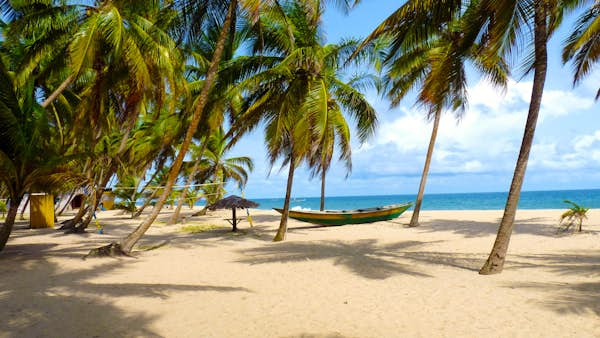
In the past decade, the Nigerian government has made efforts to improve the country’s Ease of Doing Business ranking.
In 2017, it announced new visa considerations for business travelers and tourists. This was updated with the Nigeria Visa Policy 2020. If you’re traveling to Nigeria for tourism, sports, entertainment, medical or religious reasons you qualify for the 90-day Short Visitor Visa.
Explore the planet’s most surprising adventures with our weekly newsletter delivered to your inbox.
As recently as five years ago, you would have had to choose from one of six categories when applying for a tourist or visitor visa to Nigeria. Now, you would easily fit into one of at least 75 categories. And while previously you could only apply for visas at the Nigeria Consular Mission nearest to you, it’s now possible to do so through one of four approved channels.
Only citizens of ECOWAS/CEDEAO-member countries, Chad and Cameroon can enter Nigeria visa-free. Like everyone else, they need a passport valid for at least six months and two blank pages for the stamps. Alternatively, they can travel with the ECOWAS/CEDEAO travel certificate.
 All visitors to Nigeria need a passport that’s valid for at least six months © Wirestock / Getty Images
All visitors to Nigeria need a passport that’s valid for at least six months © Wirestock / Getty Images
Applying for a visa
The Nigerian Immigration Service encourages potential travelers to use any of its Visa Application Centers around the world. And depending on your nationality, and whether you’re applying for a single-entry or multiple-entry visa, current fees payable range from $2 to $400.
Traveling on a US passport
If you’re traveling on a US passport, you may apply at the Online Integrated Services (OIS) centers in New York, Atlanta, Los Angeles, Houston, Atlanta or Washington D.C (fee: $160). The process begins online where you choose your location and book an appointment date.
A common bottleneck when applying online, especially for first-time applicants, is getting the right specifications for the passport photo required for upload. The passport photograph needs to be 35x40mm (1.37×1.57in), should be in color and on a white background.
You’ll need to download and print your application form, acknowledgement slip, and payment slip. Be sure to also have the following documents: email printout of appointment date, flight and hotel bookings, two recent passport photographs, letter of invitation from your host in Nigeria and printout of their passport data page.
You’ll also need to provide bank statements (two months’ worth, at least), which must show a minimum balance of $500–1000, depending on which center you’re applying through. You must also have proof of yellow fever and polio vaccinations.
And most importantly, you’ll need to submit these documents with two US Postal Service Priority Mail Express, with matching stamps – your passport will be sent back to you in one of those, whatever the decision taken on your visa application.
Traveling from the rest of the world
The e-Visa or Visa on Arrival is open to all travelers, including citizens of African Union (AU) countries. Westerners pay anything from $140–270 when applying for a Visa on Arrival, and must provide return tickets, a passport photograph (white background) and a scanned copy of their passport data page. There is also a $90 charge for biometrics.
You can apply yourself, following the step-by-step guide on the Nigeria Immigration Service portal. You’ll need to have the following documents for upload on the portal: letter of introduction, letter of invitation, flight itinerary, a copy of your passport data page, a copy of your visa application, and certificate of incorporation (for business travelers).
All applications for Visa on Arrival can only be made no later than two weeks before your flight is due to depart; and you must get an approval (via email) before flying from your country of residence.
Note the Reference ID and Application ID; it’s what the immigration officers need to verify your application and grant you passage. The first approval (by mail) is for a 14-day period, so you’re expected to fly into Nigeria within that time frame. At the port of entry, you’ll receive a 30-day visa.
If you’re traveling with minors, make your application for Visa on Arrival and send an email to the Comptroller-General Immigration (cgis@nigeriaimmigration.gov.ng) with a copy of the child’s birth certificate and a copy of your passport data page. As with the Visa on Arrival, await approval via email before flying to the port of entry.
Extending your stay
Except for transit visas and Temporary Work permits, it is possible to extend your Short Stay Visa. This you can do by physically visiting the Nigeria Immigration Service (NIS) offices in Nigeria, in Abuja or Lagos, at least 30 days before the visa expires. It’s possible to apply for an extension of 90 days and more.
Upon arrival
So you have your visa and you finally arrive in Lagos or Abuja. The Nigeria airport system will test your patience – allow two to three hours to navigate customs and passport control. If its your first time in the country, steel yourself for the humidity, some rowdiness – and possibly soliticious greetings from airport officials. Keep a friendly aura but walk on by.
Some of these shortcoming notwithstanding, outside the terminal is a whole new world; get ready for one of the most memorable trips you’ll ever have in West Africa.



